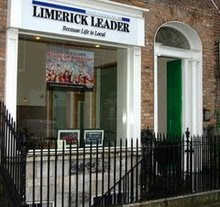
On Sunday sports editor PJ Cunningham (pictured right - aided and abetted by Enda McEvoy, Kieran Shannon, Dave Hannigan, Malachy Clerkin & Pat Nugent) published a special souvenir supplement on the individuals the Sunday Tribune deemed the ‘125 Most Influential People In GAA History’.
Four fine Limerick men featured on the list with Ballylanders’ Frank Dineen ranking at an impressive third behind Michael Cusack and Michael O’Hehir (!).
Here’s what those nice people in the Sunday Tribune had to say about four of Limerick’s most famous sons:
@ 86: Michael Deering - They've always been at it in Cork. Though born and reared in Limerick, Deering helped form the Cork county board and was soon its chairman. The hurling tournament he held in 1886 between clubs from Cork and Tipp triggered the introduction of intercounty competition but within 10 years he had resigned from Central Council and Cork had withdrawn from the GAA after it had refused to play a game against Dublin (sound familiar?). Indeed there was a fear Cork would set up an alternative association. For a year it awarded its own All Ireland medals, accepted affiliations from Waterford and Limerick and was also supported by Kerry. Soon though, Cork were back with Deering on Central Council, and after his adversary Richard Blake was removed as general secretary, he assumed the position of president. He would die shortly afterwards though, becoming the only president to die in office.
@ 35: Michael Crowe - It was this Limerick IRB man who proposed that the GAA buy and establish Croke Park as its headquarters instead of Elm Park in Ballsbridge but his real legacy was as a referee. Football was a crude, lawless game at the turn of the century but Crowe would travel tirelessly around the country for 20 years refereeing games to standardise the rules. He was successful, with his officiating of the 1903 Kerry-Kildare games prompting writers to dub him the uncrowned king of referees.
@ 22: Mick Mackey - Limerick's finest, king of the solo run, the man who hit five goals in the 1936 Munster final. Give him a ball and 50 yards of grass and away he went, men and ash plants bouncing off him. While his reputation as the greatest hurler after Ring is overdue a reappraisal, he showed generations of Munster hurlers the province didn't have to be just a Cork-Tipp thing.
@ 3: Frank Dineen - Once the fastest sprinter in Ireland, Limerick-born Dineen might just be the most under-acknowledged figure in association history. The only man to serve as President and General Secretary (1895-1901), this ambitious visionary paid £3,250 out of his own pocket for the existing sports grounds on Jones's Road in 1908, years after he had ceased to be either president or secretary. As the writer Pádraig O'Toole observed, "his motivation was not to make profit but to hold the place for the GAA. By purchasing the site himself, the GAA could afford the luxury of planning future games for the stadium happy in the knowledge it would always be available to them when required".
He went into debt to do so after failing to persuade the GAA authorities it was a sound investment. Five years later, having had to sell parts of the land to the Jesuits in the meantime in order to stave off his debtors, Dineen handed the title to what would become Croke Park to the GAA for no charge. Repeat. No charge. He also had the pitch rolled and levelled, and had new facilities and stands installed for spectators.
He could sometimes be a contentious, confrontational figure. He was the main instigator in the removal of Blake as secretary, to the point Blake's book How the GAA was grabbed was initially entitled How Frank Dineen grabbed the GAA.
A journalist by occupation, Dineen edited and published the first GAA Annual and County Directory on the request of Luke O'Toole to promote the sports at a time when they received scant media coverage. In fact, when Dineen died on Good Friday, 1916, he was working at his desk as Gaelic games' editor of Sport. Right to the end, he was giving to the GAA, the man who gave the GAA Croke Park.
Brian McDonnell




0 comments:
Post a Comment